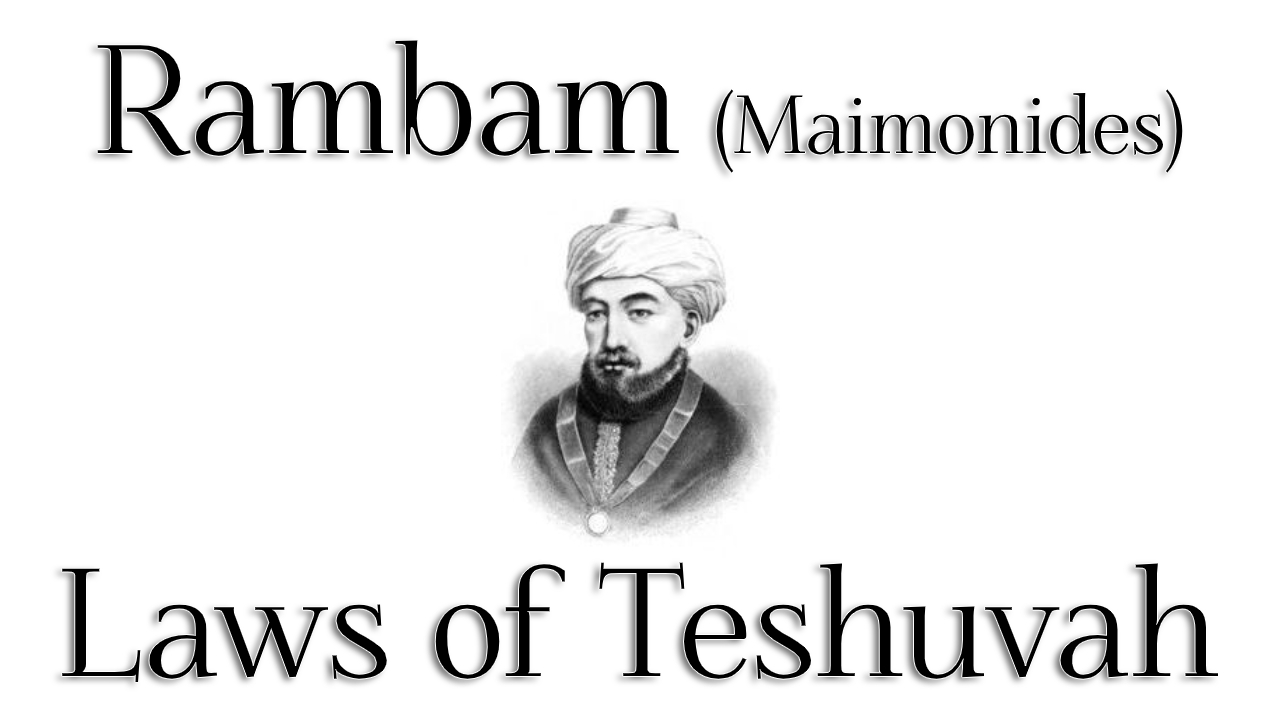
Rambam Laws of Teshuvah
Halacha 1 – 20:57
Rambam Laws of Teshuvah
Halacha 1 – 21:17
Rambam Laws of Teshuvah
Halachot 1 & 2 – 15:59
1. Each and every person has merits and sins. A person whose merits exceed his sins is [termed] righteous. A person whose sins exceed his merits is [termed] wicked. If [his sins and merits] are equal, he is termed a Beinoni. The same applies to an entire country. If the merits of all its inhabitants exceed their sins, it is [termed] righteous. If their sins are greater, it is [termed] wicked. The same applies to the entire world. 2. If a person’s sins exceed his merits, he will immediately die because of his wickedness as [Jeremiah 30:14] states: “[I have smitten you…] for the multitude of your transgressions.” Similarly, a country whose sins are great will immediately be obliterated as implied by [Genesis 18:20]: “The outcry of Sodom and Amorah is great…. In regard to the entire world as well, were its [inhabitants’] sins to be greater than their merits, they would immediately be destroyed as [Genesis 6:5] relates: “God saw the evil of man was great… [and God said: `I will destroy man….’]” This reckoning is not calculated [only] on the basis of the number of merits and sins, but also [takes into account] their magnitude. There are some merits which outweigh many sins as implied by [I Kings 14:13]: “Because in him, there was found a good quality.” In contrast, a sin may outweigh many merits as [Ecclesiastes 9:18] states: “One sin may obscure much good.” The weighing [of sins and merits] is carried out according to the wisdom of the Knowing God. He knows how to measure merits against sins. א: כָּל אֶחָד וְאֶחָד מִבְּנֵי הָאָדָם יֵשׁ לוֹ זְכֻיּוֹת וַעֲוֹנוֹת. מִי שֶׁזְּכֻיּוֹתָיו יְתֵרוֹת עַל עֲוֹנוֹתָיו צַדִּיק. וּמִי שֶׁעֲוֹנוֹתָיו יְתֵרוֹת עַל זְכֻיּוֹתָיו רָשָׁע. מֶחֱצָה לְמֶחֱצָה בֵּינוֹנִי. וְכֵן הַמְּדִינָה אִם הָיוּ זְכֻיּוֹת כָּל יוֹשְׁבֶיהָ מְרֻבּוֹת עַל עֲוֹנוֹתֵיהֶן הֲרֵי זוֹ צַדֶּקֶת. וְאִם הָיוּ עֲוֹנוֹתֵיהֶם מְרֻבִּין הֲרֵי זוֹ רְשָׁעָה. וְכֵן כָּל הָעוֹלָם כֻּלּוֹ: ב: אָדָם שֶׁעֲוֹנוֹתָיו מְרֻבִּין עַל זְכֻיּוֹתָיו מִיָּד הוּא מֵת בְּרִשְׁעוֹ שֶׁנֶּאֱמַר עַל רֹב עֲוֹנֵךְ. וְכֵן מְדִינָה שֶׁעֲוֹנוֹתֶיהָ מְרֻבִּין מִיָּד הִיא אוֹבֶדֶת שֶׁנֶּאֱמַר (בראשית יח כ) “זַעֲקַת סְדֹם וַעֲמֹרָה כִּי רָבָּה” וְגוֹ’. וְכֵן כָּל הָעוֹלָם כֻּלּוֹ אִם הָיוּ עֲוֹנוֹתֵיהֶם מְרֻבִּין מִזְּכֻיּוֹתֵיהֶן מִיָּד הֵן נִשְׁחָתִין שֶׁנֶּאֱמַר (בראשית ו ה) “וַיַּרְא ה’ כִּי רַבָּה רָעַת הָאָדָם”. וְשִׁקּוּל זֶה אֵינוֹ לְפִי מִנְיַן הַזְּכֻיּוֹת וְהָעֲוֹנוֹת אֶלָּא לְפִי גָּדְלָם. יֵשׁ זְכוּת שֶׁהִיא כְּנֶגֶד כַּמָּה עֲוֹנוֹת שֶׁנֶּאֱמַר (מלכים א יד יג) “יַעַן נִמְצָא בוֹ דָּבָר טוֹב”. וְיֵשׁ עָוֹן שֶׁהוּא כְּנֶגֶד כַּמָּה זְכֻיּוֹת שֶׁנֶּאֱמַר (קהלת ט יח) “וְחוֹטֶא אֶחָד יְאַבֵּד טוֹבָה הַרְבֵּה”. וְאֵין שׁוֹקְלִין אֶלָּא בְּדַעְתּוֹ שֶׁל אֵל דֵּעוֹת וְהוּא הַיּוֹדֵעַ הֵיאַךְ עוֹרְכִין הַזְּכֻיּוֹת כְּנֶגֶד הָעֲוֹנוֹת:
Rambam Laws of Teshuvah
Halacha 1 – 21:33
1. There are 24 deeds which hold back Teshuvah: Four are the commission of severe sins. God will not grant the person who commits such deeds to repent because of the gravity of his transgressions. They are: a) One who causes the masses to sin, included in this category is one who holds back the many from performing a positive command; b) One who leads his colleague astray from the path of good to that of bad; for example, one who proselytizes or serves as a missionary [for idol worship]; c) One who sees his son becoming associated with evil influences and refrains from rebuking him. Since his son is under his authority, were he to rebuke him, he would have separated himself [from these influences]. Hence, [by refraining from admonishing him, it is considered] as if he caused him to sin. Included in this sin are also all those who have the potential to rebuke others, whether an individual or a group, and refrain from doing so, leaving them to their shortcomings. d) One who says: “I will sin and then, repent.” Included in this category is one who says: “I will sin and Yom Kippur will atone [for me].”
א: אַרְבָעָה וְעֶשְׂרִים דְּבָרִים מְעַכְּבִין אֶת הַתְּשׁוּבָה. אַרְבָּעָה מֵהֶן עָוֹן גָּדוֹל וְהָעוֹשֶׂה אֶחָד מֵהֶן אֵין הַקָּדוֹשׁ בָּרוּךְ הוּא מַסְפִּיק בְּיָדוֹ לַעֲשׂוֹת תְּשׁוּבָה לְפִי גֹּדֶל חֶטְאוֹ. וְאֵלּוּ הֵן א) הַמַּחְטִיא אֶת הָרַבִּים וּבִכְלַל עָוֹן זֶה הַמְעַכֵּב אֶת הָרַבִּים מִלַּעֲשׂוֹת מִצְוָה ב) וְהַמַּטֶּה אֶת חֲבֵרוֹ מִדֶּרֶךְ טוֹבָה לְרָעָה כְּגוֹן מֵסִית וּמַדִּיחַ ג) הָרוֹאֶה בְּנוֹ יוֹצֵא לְתַרְבּוּת רָעָה וְאֵינוֹ מְמַחֶה בְּיָדוֹ. הוֹאִיל וּבְנוֹ בִּרְשׁוּתוֹ אִלּוּ מִחָה בּוֹ הָיָה פּוֹרֵשׁ וְנִמְצָא כְּמַחְטִיאוֹ. וּבִכְלַל עָוֹן זֶה כָּל שֶׁאֶפְשָׁר בְּיָדוֹ לִמְחוֹת בַּאֲחֵרִים בֵּין יָחִיד בֵּין רַבִּים וְלֹא מִחָה אֶלָּא יַנִּיחֵם בְּכִשְׁלוֹנָם ד) וְהָאוֹמֵר אֶחְטָא וְאָשׁוּב וּבִכְלַל זֶה הָאוֹמֵר אֶחְטָא וְיוֹם הַכִּפּוּרִים מְכַפֵּר

